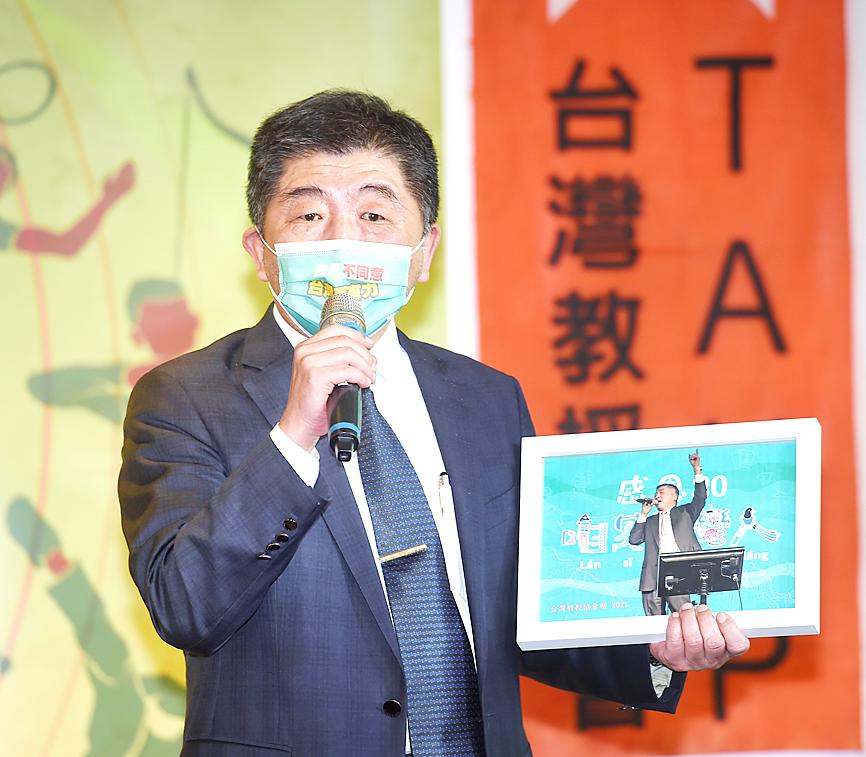Minister of Health and Welfare Chen Shih-chung (陳時中) yesterday said he would not sing in public for a while, as his mood for singing has been affected by a controversial video of him that circulated online earlier this month.
Chen, who heads the Central Epidemic Command Center (CECC), made the remark at a Taiwan Association of University Professors’ Thanksgiving fundraiser in Taipei yesterday.
The clip, which began circulating on Nov. 10, shows him singing indoors without a mask, which led to accusations that he had contravened COVID-19 prevention rules during a nationwide level 3 pandemic alert.

Photo: Fang Pin-chao, Taipei Times
However, as the video was recorded on June 15 last year, when Taiwan did not have many domestic COVID-19 cases, Premier Su Tseng-chang (蘇貞昌) on Nov. 12 said that it was part of a Chinese disinformation campaign to demoralize the nation and discredit the CECC.
At yesterday’s event, Chen refused the host’s invitation to sing with him, saying that he had not felt like singing in public since the controversy.
It reminded him that he should work harder and focus on his duties, he said.
“I was confident that I was a good singer because everyone applauded, but after seeing the video on TV, I found out that I don’t have the moves, nor did I sing very well,” he said.
Maybe the people only applauded because he is the health minister, Chen said.
When he was in elementary school, he used to sing songs with a friend, but when asking the friend about his singing, the friend said that all the songs he sang sounded the same, Chen said.
“His reply was a heavy blow to me,” Chen joked. “After that day, I didn’t dare to sing in public for a long time.”
He still sometimes sings in the bathroom, but his wife has told him that his tempo and pitch are slightly off, he said.
After she offered him singing lessons, he also lost interest in singing at home, he said.

Taiwan yesterday denied Chinese allegations that its military was behind a cyberattack on a technology company in Guangzhou, after city authorities issued warrants for 20 suspects. The Guangzhou Municipal Public Security Bureau earlier yesterday issued warrants for 20 people it identified as members of the Information, Communications and Electronic Force Command (ICEFCOM). The bureau alleged they were behind a May 20 cyberattack targeting the backend system of a self-service facility at the company. “ICEFCOM, under Taiwan’s ruling Democratic Progressive Party, directed the illegal attack,” the warrant says. The bureau placed a bounty of 10,000 yuan (US$1,392) on each of the 20 people named in

The High Court yesterday found a New Taipei City woman guilty of charges related to helping Beijing secure surrender agreements from military service members. Lee Huei-hsin (李慧馨) was sentenced to six years and eight months in prison for breaching the National Security Act (國家安全法), making illegal compacts with government employees and bribery, the court said. The verdict is final. Lee, the manager of a temple in the city’s Lujhou District (蘆洲), was accused of arranging for eight service members to make surrender pledges to the Chinese People’s Liberation Army in exchange for money, the court said. The pledges, which required them to provide identification

Nine retired generals from Taiwan, Japan and the US have been invited to participate in a tabletop exercise hosted by the Taipei School of Economics and Political Science Foundation tomorrow and Wednesday that simulates a potential Chinese invasion of Taiwan in 2030, the foundation said yesterday. The five retired Taiwanese generals would include retired admiral Lee Hsi-min (李喜明), joined by retired US Navy admiral Michael Mullen and former chief of staff of the Japan Self-Defense Forces general Shigeru Iwasaki, it said. The simulation aims to offer strategic insights into regional security and peace in the Taiwan Strait, it added. Foundation chair Huang Huang-hsiung

’DISTORTION’: Beijing’s assertion that the US agreed with its position on Taiwan is a recurring tactic it uses to falsely reinforce its sovereignty claims, MOFA said The Ministry of Foreign Affairs (MOFA) yesterday said Chinese state media deliberately distorted Taiwan’s sovereign status, following reports that US President Donald Trump agreed to uphold the “one China” policy in a phone call with Chinese President Xi Jinping (習近平). During the more than one-hour-long call, Xi urged Trump to retreat from trade measures that roiled the global economy and cautioned him against threatening steps on Taiwan, a Chinese government summary of the call said. China’s official Xinhua news agency quoted Xi as saying that the US should handle the Taiwan issue cautiously and avoid the two countries being drawn into dangerous